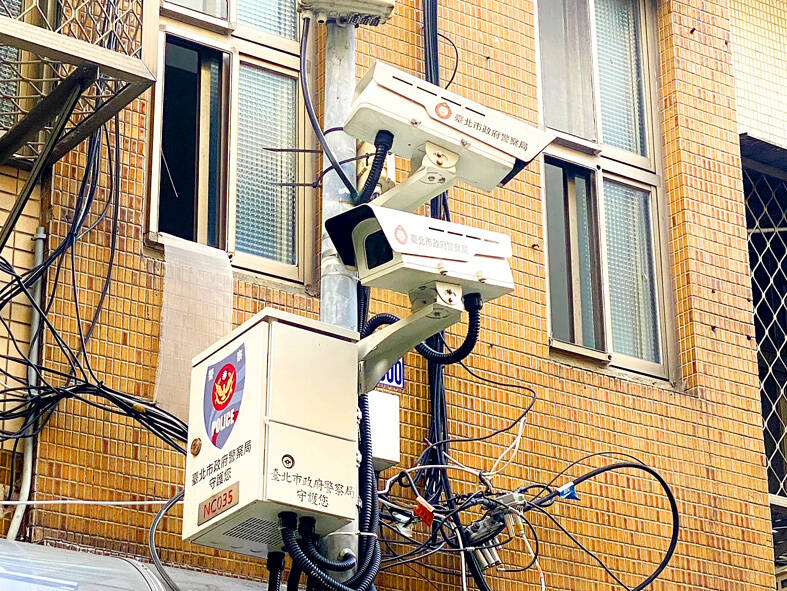Taipei still has scores of “blind spots” not covered by surveillance cameras that are prone to criminal activity, a report by the National Audit Office said.
The office mandated the Taipei City Police Department to install more surveillance cameras in 41 locations to assist in fighting crime and better safeguard the public.
The police department said that it plans to install 500 surveillance cameras by the end of this year and another 400 units next year.

Photo: Yang Hsin-hui, Taipei Times
The report cited 48,000 locations in Taipei that had been the site of one of the following categories of criminal offenses: homicide, burglary, violence resulting in injury, theft, endangering public safety, destruction of property and offenses against freedom (which Chapter 26 of the Criminal Code says include abduction, forceful confinement, sexual assault and restricting freedom of movement).
The report further listed 41 places as “blind spots” that have no “video recording coverage” within 200m, which had been the site of a major crime five or more times last year.
The lack of surveillance cameras could give rise to further criminal incidents, and authorities must take remedial measures to prevent crime and safeguard the public, the report said.
The Taipei City Police Department said that street surveillance cameras are used to protect public security, but it also has to respect people’s right to privacy.
Decisions to install security cameras are made based on the type of public spaces and implemented in stages based on a priority list for budget allocation and urgency of public need, it said.
“The priority is to install [cameras] at known hot spots of criminal activities, as well as based on past criminal incidents and investigation records, along with traffic conditions,” it said.
The department undertakes on-site inspections and assessments of these locations with relevant authorities for a prudent evaluation of the location and the number of cameras that need to be installed, it said.
Some of the blind spots cited in the report have no cameras due to environmental and other factors, while others that do not have sufficient coverage could be filled by cameras in the area installed by private citizens, dashcams of passing vehicles, eyewitness accounts, gathering of evidence and forensic examination during a criminal investigation, it said.
In 2021, Taipei had 15,616 street surveillance cameras and reported 34,180 criminal incidents that year, of which 8,671 cases were solved with the aid of surveillance cameras, it said.
In 2022, the city reported 36,210 criminal incidents, of which 13,300 cases were solved with the aid of surveillance cameras.
Last year, with the total number of surveillance cameras reaching 18,094, it solved 13,091 of the 38,523 reported criminal incidents.

POSITIVE DEVELOPMENT: Japan and the US are expected to hold in-depth discussions on Taiwan-related issues during the meeting next month, Japanese sources said The holding of a Japan-US leaders’ meeting ahead of US President Donald Trump’s visit to China is positive news for Taiwan, former Japan-Taiwan Exchange Association representative Hiroyasu Izumi said yesterday. After the Liberal Democratic Party’s landslide victory in Japan’s House of Representatives election, Japanese Prime Minister Sanae Takaichi is scheduled to visit the US next month, where she is to meet with Trump ahead of the US president’s planned visit to China from March 31 to April 2 for a meeting with Chinese President Xi Jinping (習近平). Japan and the US are expected to hold in-depth discussions on Taiwan-related issues during the

‘LIKE-MINDED PARTNER’: Tako van Popta said it would be inappropriate to delay signing the deal with Taiwan because of China, adding he would promote the issue Canadian senators have stressed Taiwan’s importance for international trade and expressed enthusiasm for ensuring the Taiwan-Canada trade cooperation framework agreement is implemented this year. Representative to Canada Harry Tseng (曾厚仁) in an interview with the Central News Agency (CNA) said he was increasingly uneasy about Ottawa’s delays in signing the agreement, especially as Ottawa has warmed toward Beijing. There are “no negotiations left. Not only [is it] initialed, we have three versions of the text ready: English, French and Mandarin,” Tseng said. “That tells you how close we are to the final signature.” Tseng said that he hoped Canadian Prime Minister Mark Carney

President William Lai (賴清德) yesterday bestowed one of Taiwan’s highest honors on Saint Vincent and the Grenadines (SVG) Ambassador Andrea Clare Bowman in recognition of her contributions to bilateral ties. “By conferring the Order of Brilliant Star with Grand Cordon on Ambassador Bowman today, I want to sincerely thank her, on behalf of the Taiwanese people, for her outstanding contribution to deepening diplomatic ties between Taiwan and SVG,” Lai said at a ceremony held at the Presidential Office in Taipei. He noted that Bowman became SVG’s first ambassador to Taiwan in 2019 and

A man walks past elementary school artworks at the Taipei Lantern Festival in Ximen District yesterday, the first day of the event. The festival is to run from 5pm to 10pm through March 15.